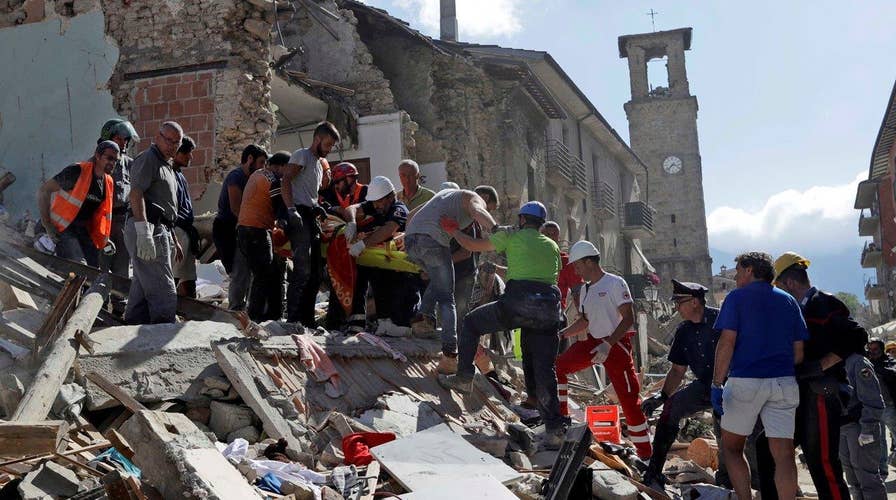AMATRICE, Italy – In three days, the rugged residents of the medieval Italian hill town of Amatrice had planned to hold one of their most joyful events of the year: the 50th edition of a food festival celebrating their beloved Amatriciana pasta dish, which is made from local ingredients.
Instead, they will now be mourning the dozens dead from a strong earthquake that trapped residents in their homes as they slept.
Due to the upcoming food festival, known as a sagra, there was an influx of visitors to the town, so it was very hard to know how many people were sleeping Wednesday morning in Amatrice when the quake struck at 3:36 a.m.
The mayor said about 70 people had been staying in the Hotel Roma, a town landmark that has a restaurant which serves the famous pasta dish. Rescue workers pulled five bodies from the rubble of the hotel but had to halt rescue operations late Wednesday night because it was too dangerous working in the dark.
Roberto Renzi said he was sleeping "soundly and most tranquilly" when he was jostled awake by the 6.2-magnitude tremor. He said he instantly knew this quake was far, far worse than the "little movements" locals are used to in this quake-prone belt straddling Italy's rocky Apennines mountains.
His three-story house and the one next to it miraculously remained standing, but the door to his third-floor bedroom was jammed by the quake. He grabbed a fire stoker and pried the door open and ran with his wife to the safety of the street. Renzi said a woman who owns a bed and breakfast across the street escaped by knotting bed sheets and climbing down her building.
Some people never made it out of their beds at all. Dozens are dead in Amatrice amid an overall toll of at least 247 people killed in the region by the quake, according to Italy's prime minister.
And the death toll could rise as rescuers with sniffer dogs prepared to work through the night, checking house after house that had collapsed into mounds of dust and twisted metal.
At a four-story apartment complex on the edge of town, two top floors appeared to be largely intact, but the second floor had lost its exterior walls, exposing a brass bed perched precariously in a child's room. In the dining room next to it, a hanging ceiling lamp and a wall mirror were unscathed by the earthquake.
Renzi left town carrying two shopping bags of possessions that firefighters allowed him to retrieve. Yet just behind him in a devastated convent, rescuers with dogs searched through the rubble for seven women — four elderly women who had been spending their summer holiday there and three nuns who had been caring for them.
A section of the convent reserved exclusively for males appeared completely unscathed. The convent abuts the Church of the Most Holy Crucifix, where a sign outside recounts how the church was heavily damaged in earthquakes in 1639 and in the early 20th century.
Waiting for news outside with infinite patience was Pina Agostini, the daughter of one of the missing guests. Tanned from her own holiday on the Adriatic coast, Agostini said she felt the quake there herself and instantly thought of her 85-year-old mother, Gilda Morante.
"I called but no one was answering," she said, surrounding by other family members of the elderly residents, all waiting for news. They had been sitting there since early morning.
"No, eh?" she called out as two rescue workers appeared.
She said her mother, a native of Amatrice who now lives in Rome, had been spending a restful holiday since July and would have come home after this weekend's traditional festival.
People come to Amatrice for the folklore, the traditions and the food, especially pasta Amatriciana, featuring chewy bits of pork jowl, pecorino cheese and tomato sauce.
Posters advertising this year's festival lined the dusty walls of the destroyed town, which had billed itself as among the most beautiful in Italy. One poster promised a procession of people wearing traditional costumes and showed a woman walking with a jug of water on her head.
In contrast to the violent destruction of the quake, the courtyard of the heavily damaged convent featured a bed of roses and a breathtaking view of a valley, where five horses placidly grazed.








































